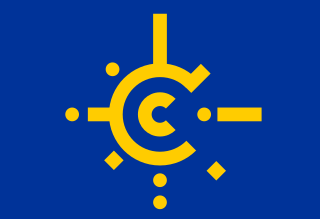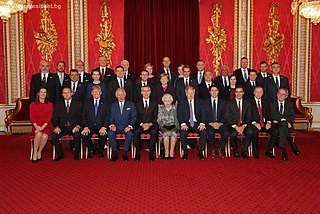
Eastern Europe is a subregion of the European continent. As a largely ambiguous term, it has a wide range of geopolitical, geographical, ethnic, cultural, and socio-economic connotations. The vast majority of the region is covered by Russia, which spans roughly 40% of the continent's landmass while accounting for approximately 15% of its total population.

The Central European Free Trade Agreement (CEFTA) is an international trade agreement between countries mostly located in Southeastern Europe. Founded by representatives of Poland, Hungary and Czechoslovakia, CEFTA expanded to Albania, Bosnia and Herzegovina, Bulgaria, Croatia, Moldova, Montenegro, North Macedonia, Romania, Serbia, Slovenia and the UNMIK.

Pro-Europeanism, sometimes called European Unionism, is a political position that favours European integration and membership of the European Union (EU).

Europe, the westernmost portion of Eurasia, is often divided into regions and subregions based on geographical, cultural or historical factors. Since there is no universal agreement on Europe's regional composition, the placement of individual countries may vary based on criteria being used. For instance, the Balkans is a distinct geographic region within Europe but individual countries may alternatively be grouped into Southern Europe, Southeastern Europe, or less commonly East Central Europe.
European integration is the process of industrial, economic, political, legal, social, and cultural integration of states wholly or partially in Europe or nearby. European integration has primarily come about through the European Union and its policies.
The Vilnius letter was a declaration of support for the 2003 invasion of Iraq from the nations of the Vilnius Group. It was published at the height of the Iraq disarmament crisis of early 2003, expressing confidence in the evidence presented by the U.S that Iraq had violated UN resolutions.
The "letter of the eight" was an open letter, jointly signed by the prime ministers of five of the then fifteen members of the European Union together with three high representatives for the Central European countries that were to enter the union in 2004, published in the Wall Street Journal, The Times of London, and other international newspapers on 30 January 2003 under the title "Europe and America Must Stand United". It expressed indirect support for United States ambition of a régime change in Iraq in the lead-up to the 2003 invasion of Iraq. To most observers it demonstrated a total division within the EU in respect to foreign policy and attitudes towards international law.

The Model European Parliament (MEP) is an international simulation of the working of the European Parliament for students aged 16–19. The aim of the programme is to give young people an insight into the workings of the European Parliament and raise their awareness of European citizenship. Two sessions are held each year, each involving 180 secondary school students.
Partnership for Peace Information Management System (PIMS) is a US Department of Defense Bilateral Cooperative Development Program started in 1996 to enable collaboration and communication between Partnership for Peace (PfP) countries and the NATO community.

The Atlantic Treaty Association (ATA) is an umbrella organization which draws together political leaders, academics, military officials, and diplomats to support the North Atlantic Treaty Organization (NATO). The ATA is an independent organization that is separate from NATO.

A NATO summit is a summit meeting that is regarded as a periodic opportunity for heads of state and heads of government of NATO member countries to evaluate and provide strategic direction for Alliance activities.
East Central Europe is the region between German-, Hungarian-, and West Slavic-speaking Europe and the East Slavic countries of Belarus, Russia, and Ukraine. Those lands are described as situated "between two": "between two worlds, between two stages, between two futures". In the geopolitical sense, East-Central Europe can be considered alongside Western and Eastern Europe, as one of the "Three Europes". The largest East Central Europe academic research groups tends to disinclude Russia and Germany, but appreciate their historical influences in this area.
The 2019 FIBA Basketball World Cupqualification for the FIBA Europe region, began in August 2017 and concluded in February 2019. Contrary to previous years, no teams were automatically placed into the World Cup, so all FIBA Europe nations had to participate in qualification.
The Slovenia national football team represents Slovenia in association football and is controlled by the Football Association of Slovenia, the governing body for football in Slovenia. It competes as a member of the Union of European Football Associations (UEFA), which encompasses the countries of Europe. Slovenia joined UEFA and the International Federation of Association Football (FIFA) in 1992, a year after the country gained independence from the Socialist Federal Republic of Yugoslavia.

The EuroBasket 2022 qualification was a basketball competition that was played from November 2017 to February 2021, to determine the 20 FIBA Europe nations who would join the automatically qualified co-hosts Czech Republic, Georgia, Italy, and Germany at the EuroBasket 2022 finals tournament.
This page describes the qualification procedure for FIBA Women's EuroBasket 2021. 14 teams joined the co-hosts France and Spain.

These are all the matches played by the Macedonia national football team from 1993 to 2018:
This page described the qualification procedure for EuroBasket Women 2023. 14 teams joined the co-hosts Israel and Slovenia.
This is a list of the Estonia national football team results from 1991 to 2009.









